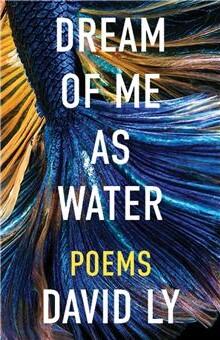
David Ly’s latest poetry collection is an exacting, linguistic dreamscape that reveals a hand-wringing insistence on getting it right: not by way of laboured, elaborate plots or pointed specificity, but instead by whittling and chipping at the edges of crumbling marble to uncover the it he imagines lying recumbent underneath. Dream of Me as Water is divided into three gradually expanding parts titled “Dream,” “Dream of Me,” and “Dream of Me as Water,” a subtle enactment of the advancing potential of the miniscule, the fecund possibilities if we look close, closer, and then the closest. Ly gets to where he’s going, but at a shifting pace and broadening scope that strikes this reader as entirely captivating.
The I/you formula favourite of the confessional-lyric mode is present throughout and generates the sensation of intimacy between friends, an unearned confidentiality that lures and lulls from one metaphor to another: Ly tells us about an alternate timeline with an alternate version of himself as a paleontologist, but “this David isn’t bad with science like I am” and this David pours his creativity into “hypotheses about functions” instead of “using imagination to craft poems” (“Future Excavation” 27). Ly ponders these contradictions through a speaker who sees himself in everything: he is both “the ocean / and the lightening that could / strike it at any moment” (“Conducting Myself” 37).
Themes of dreams and the dream-state dominate this collection placing the philosophical focus on the dark corners and places still unknown to us, such as the sleeping mind or the ocean floor. Ly slips insights into seascapes and filters them through the subconscious and the darknesses we hide from even ourselves, so the resulting nugget of wisdom feels impermanent and already drifting away, no matter how much we clasp to hang on. Like water, these poems occasionally distort, but a distortion that acts more like a magnifying glass (think of the sudden clarity of moss on the surface of river rock only when rushed by clear water): expanding some things while simultaneously obscuring others; generating meaning on one hand, but at the cost of earlier meanings sliding out as mysteriously as they slithered in on the other. At times the surface of this collection smooths and blends the abstract and the tangible into alignment; at others, the surface swallows and lurches (think of white-water rapids), darts and pivots, tumbles and turns, then finally leaves us – stunned – to rest on the shore.
Dream of Me as Water is also a commentary on modern apprehensions and the peacelessness of the crowded contemporary world; for example “Hello, Worry” offers the idea that “apparently it can help / to picture a cloud / passing across the sky” (18) and “Way to Deal With Worry” is a point-form list that includes the advice to “Uninstall Twitter” (63). “Seas of Origin,” is a rumination on the twin pressures to show up in the world nobly, such as to “reference race, racism, or queerness in his poems,” and on the other hand to protect his “wish to simply recount feeling at ease” without the modern stranglehold of over-visibility and instant public scrutiny. Ly explains these “facets of identity” don’t offer the freedom they claim to; instead they obscure “how else he can be seen,” limiting or attempting to limit opportunities for his work to resonate outside of prescribed identity barriers (36). Ly captures something very relatable about the experience of cancel culture in his prose poem “I Would Love to Love.” Referencing Stevie Nicks, Ly writes, “Like any millennial, I’d like to tweet my newfound love for the singer … but before sending the tweet my thumb hovers just in case … I would love to love her without the possible terror of waking up to headlines or tweets guilting me for being a fan” (“I Would Love to Love” 58). That moment that now comes between the instance of discovering a new love and sharing that discovery; a moment that lingers in the thumb and asks What if Stevie Nicks is cancelled and I’m the last to know? Perhaps it’s that moment of undiluted fear that separates the anxious from the arrogant, the boomer from the millennial, and the poet from the paleontologist. “I Only Remember Dreams When Stressed” is a sonnet for a trumpeting, white peacock on Vancouver’s SkyTrain platform that reiterates the distance between ourselves and the place(s) we find ourselves in and exaggerates the chasm between commerce and art so we might better imagine the universe of meaning between the human ear and the bird’s song, especially through the maze of commuter interference. Themes of loneliness and isolation permeate these contemporary scenes and pull us to the point where we fall off the periphery and resurface again somewhere close to where we started.
Dream of Me as Water is a current, referential collection that imagines the uncharted terrain of that which we suppress, hide or condemn, and pulls it up to the surface to behold. It’s a compelling spell, a dream inside a dream while imagery floods and rushes these poems, obscuring their surfaces and dazzling the eye with flashes of light that glitter and dip. The power of these poems is their subtle shifts in direction, their obscuring watery reflections, their brief glimpses of cuttlefish or a blue-ringed octopus or the “tentacles to feed on doubts” that Ly shows us in his outstretched palm before plunging it all back under water.
— Amber McMillan
is the author of This Is a Stickup, The Running Trees, The Woods: A Year on Protection Island, and We Can't Ever Do This Again. She lives in New Brunswick.










